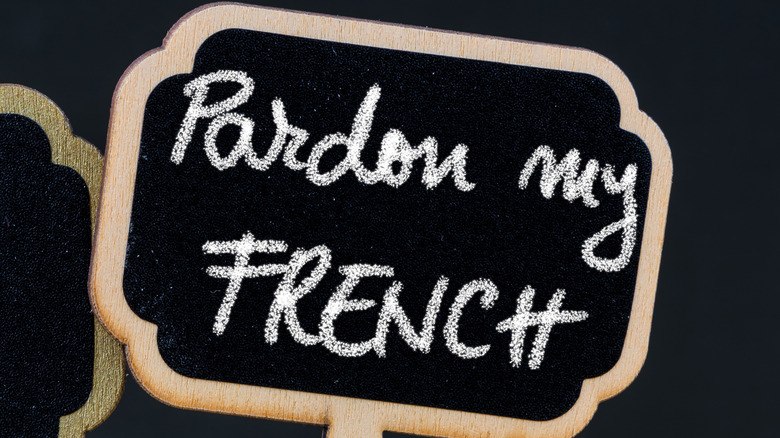Where Does The Phrase Pardon My French Come From?
You hear it all the time: "Pardon my French..." followed by an unsavory four-letter word that would make your grandmother faint on the spot if she heard you say it. '80s babies might even recall that slapstick moment from "Ferris Bueller's Day Off" when Cameron declares over the phone to his clueless and confounded principal: "Rooney, pardon my French, but you're an..." Yeah, you remember.
But are the French really to blame for the plethora of nasty words we used to get scolded for using as kids? Why do people forewarn listeners to pardon their French before making a profane remark? If everyday curse words really had semantic roots in the French language, it would go without saying that the vast majority of people in the English-speaking world know fluent French. As you probably guessed, that's not the case. The phrase, according to certain experts, most likely appeared in United States sometime during the 1800s (via Mental Floss).
French revolution of words
"Pardon my French" is a phrase exclusive to the English language, which means that there is no corresponding idiom one can attribute to actual French. According to Mental Floss, upper class individuals in early 1800s America would often decorate their conversations with French words here and there. If they were addressing someone they deemed lower class, they would preface any and all such words with "Pardon my French," condescendingly assuming that the person they were speaking to was likely unfamiliar with French terms. Throughout the years, this morphed into a sardonic introduction to using a curse word, as if one were speaking in a manner of refinement rather than obscenity.
However, the practice of dribbling French words into English exchanges actually stretches all the way back to 1066 when William, Duke of Normandy (William the Conquerer), overtook England and its ruling class. He began integrating the French language into the English lexicon by means of merging the two cultures, so English aristocrats who were familiarizing themselves with the fancy new words realized that not everyone would comprehend what they were saying. Hence, "Pardon my French" (via Reader's Digest).

